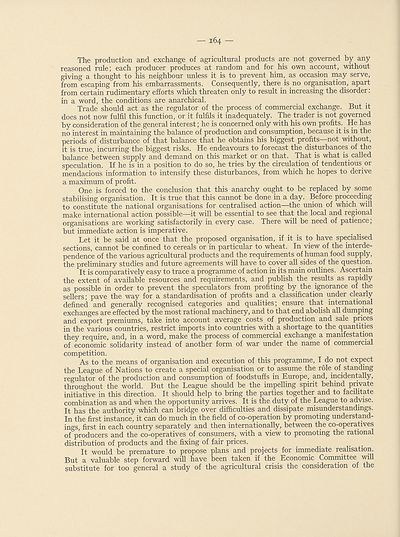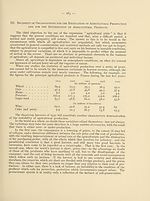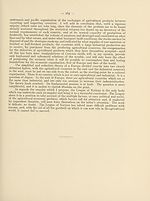Download files
Complete book:
Individual page:
Thumbnail gallery: Grid view | List view

— 164 —
The production and exchange of agricultural products are not governed by any
reasoned rule; each producer produces at random and for his own account, without
giving a thought to his neighbour unless it is to prevent hinp as occasion may serve,
from escaping from his embarrassments. Consequently, there is.no organisation, apart
from certain rudimentary efforts which threaten only to result in increasing the disorder :
in a word, the conditions are anarchical.
Trade should act as the regulator of the process of commercial exchange. But it
does not now fulfil this function, or it fulfils it inadequately. The trader is not governed
by consideration of the general interest; he is concerned only with his own profits. He has
no interest in maintaining the balance of production and consumption, because it is in the
periods of disturbance of that balance that he obtains his biggest profits—not without,
it is true, incurring the biggest risks. He endeavours to forecast the disturbances of the
balance between supply and demand on this market or on that. That is what is called
speculation. If he is in a position to do so, he tries by the circulation of tendentious or
mendacious information to intensify these disturbances, from which he hopes to derive
a maximum of profit.
One is forced to the conclusion that this anarchy ought to be replaced by some
stabilising organisation. It is true that this cannot be done in a day. Before proceeding
to constitute the national organisations for centralised action—the union of which will
make international action possible—it will be essential to see that the local and regional
organisations are working satisfactorily in every case. There will be need of patience;
but immediate action is imperative.
Let it be said at once that the proposed organisation, if it is to have specialised
sections, cannot be confined to cereals or in particular to wheat. In view of the interde¬
pendence of the various agricultural products and the requirements of human food supply,
the preliminary studies and future agreements will have to cover all sides of the question.
It is comparatively easy to trace a programme of action in its main outlines. Ascertain
the extent of available resources and requirements, and publish the results as rapidly
as possible in order to prevent the speculators from profiting by the ignorance of the
sellers; pave the way for a standardisation of profits and a classification under clearly
defined and generally recognised categories and qualities; ensure that international
exchanges are effected by the most rational machinery, and to that end abolish all dumping
and export premiums, take into account average costs of production and sale prices
in the various countries, restrict imports into countries with a shortage to the quantities
thev require, and, in a word, make the process of commercial exchange a manifestation
of economic solidarity instead of another form of war under the name of commercial
competition.
As to the means of organisation and execution of this programme, I do not expect
the League of Nations to create a special organisation or to assume the role of standing
regulator of the production and consumption of foodstuffs in Europe, and, incidentally,
throughout the world. But the League should be the impelling spirit behind private
initiative in this direction. It should help to bring the parties together and to facilitate
combination as and when the opportunity arrives. It is the duty of the League to advise.
It has the authority which can bridge over difficulties and dissipate misunderstandings.
In the first instance, it can do much in the field of co-operation by promoting understand¬
ings, first in each country separately and then internationally, between the co-operatives
of producers and the co-operatives of consumers, with a view to promoting the rational
distribution of products and the fixing of fair prices.
It would be premature to propose plans and projects for immediate realisation.
But a valuable step forward will have been taken if the Economic Committee will
substitute for too general a study of the agricultural crisis the consideration of the
The production and exchange of agricultural products are not governed by any
reasoned rule; each producer produces at random and for his own account, without
giving a thought to his neighbour unless it is to prevent hinp as occasion may serve,
from escaping from his embarrassments. Consequently, there is.no organisation, apart
from certain rudimentary efforts which threaten only to result in increasing the disorder :
in a word, the conditions are anarchical.
Trade should act as the regulator of the process of commercial exchange. But it
does not now fulfil this function, or it fulfils it inadequately. The trader is not governed
by consideration of the general interest; he is concerned only with his own profits. He has
no interest in maintaining the balance of production and consumption, because it is in the
periods of disturbance of that balance that he obtains his biggest profits—not without,
it is true, incurring the biggest risks. He endeavours to forecast the disturbances of the
balance between supply and demand on this market or on that. That is what is called
speculation. If he is in a position to do so, he tries by the circulation of tendentious or
mendacious information to intensify these disturbances, from which he hopes to derive
a maximum of profit.
One is forced to the conclusion that this anarchy ought to be replaced by some
stabilising organisation. It is true that this cannot be done in a day. Before proceeding
to constitute the national organisations for centralised action—the union of which will
make international action possible—it will be essential to see that the local and regional
organisations are working satisfactorily in every case. There will be need of patience;
but immediate action is imperative.
Let it be said at once that the proposed organisation, if it is to have specialised
sections, cannot be confined to cereals or in particular to wheat. In view of the interde¬
pendence of the various agricultural products and the requirements of human food supply,
the preliminary studies and future agreements will have to cover all sides of the question.
It is comparatively easy to trace a programme of action in its main outlines. Ascertain
the extent of available resources and requirements, and publish the results as rapidly
as possible in order to prevent the speculators from profiting by the ignorance of the
sellers; pave the way for a standardisation of profits and a classification under clearly
defined and generally recognised categories and qualities; ensure that international
exchanges are effected by the most rational machinery, and to that end abolish all dumping
and export premiums, take into account average costs of production and sale prices
in the various countries, restrict imports into countries with a shortage to the quantities
thev require, and, in a word, make the process of commercial exchange a manifestation
of economic solidarity instead of another form of war under the name of commercial
competition.
As to the means of organisation and execution of this programme, I do not expect
the League of Nations to create a special organisation or to assume the role of standing
regulator of the production and consumption of foodstuffs in Europe, and, incidentally,
throughout the world. But the League should be the impelling spirit behind private
initiative in this direction. It should help to bring the parties together and to facilitate
combination as and when the opportunity arrives. It is the duty of the League to advise.
It has the authority which can bridge over difficulties and dissipate misunderstandings.
In the first instance, it can do much in the field of co-operation by promoting understand¬
ings, first in each country separately and then internationally, between the co-operatives
of producers and the co-operatives of consumers, with a view to promoting the rational
distribution of products and the fixing of fair prices.
It would be premature to propose plans and projects for immediate realisation.
But a valuable step forward will have been taken if the Economic Committee will
substitute for too general a study of the agricultural crisis the consideration of the
Set display mode to:
![]() Universal Viewer |
Universal Viewer | ![]() Mirador |
Large image | Transcription
Mirador |
Large image | Transcription
Images and transcriptions on this page, including medium image downloads, may be used under the Creative Commons Attribution 4.0 International Licence unless otherwise stated. ![]()
| League of Nations > Economic and financial section > Agricultural crisis > Volume 1 > (166) |
|---|
| Permanent URL | https://digital.nls.uk/190904808 |
|---|
| Shelfmark | LN.II.2/2.(35) |
|---|---|
| Attribution and copyright: |
|
| Shelfmark | LN.II.2/2.(35-35) |
|---|---|
| Shelfmark | LN.II |
|---|
| Description | Over 1,200 documents from the non-political organs of the League of Nations that dealt with health, disarmament, economic and financial matters for the duration of the League (1919-1945). Also online are statistical bulletins, essential facts, and an overview of the League by the first Secretary General, Sir Eric Drummond. These items are part of the Official Publications collection at the National Library of Scotland. |
|---|---|
| Additional NLS resources: |
|

